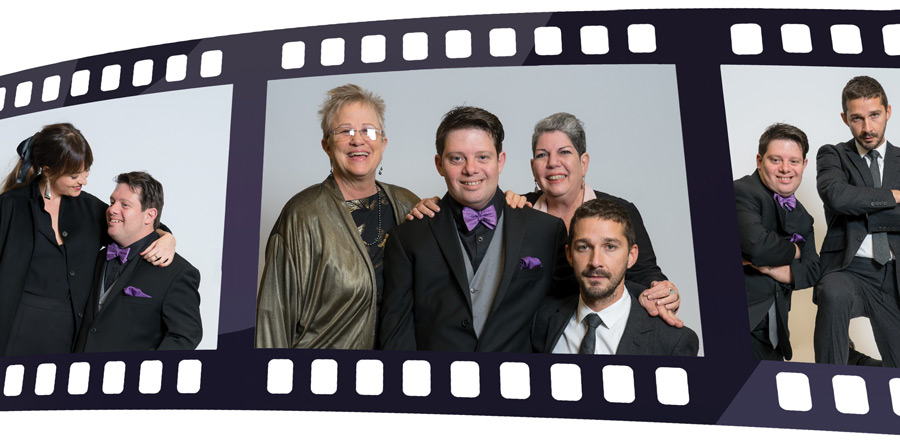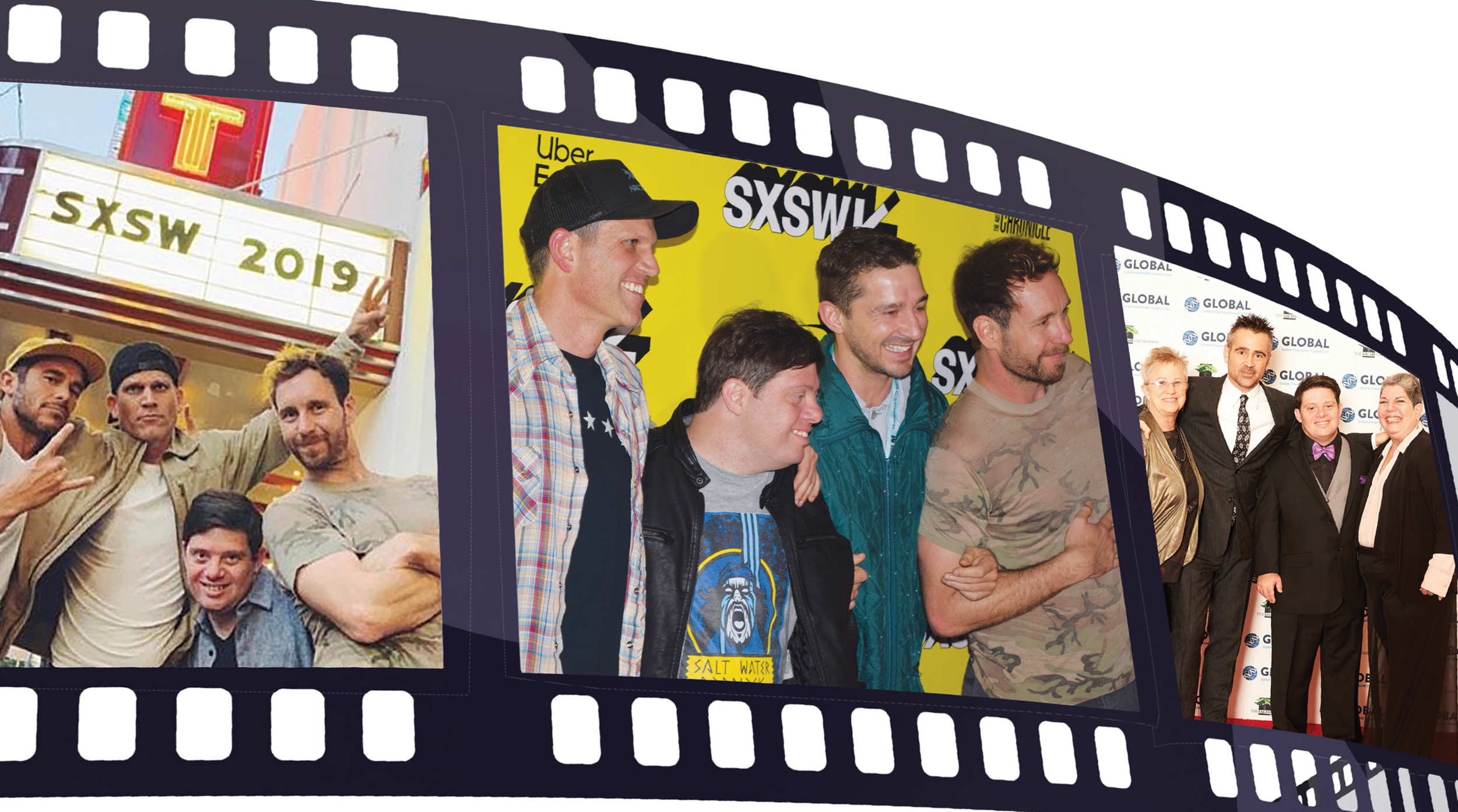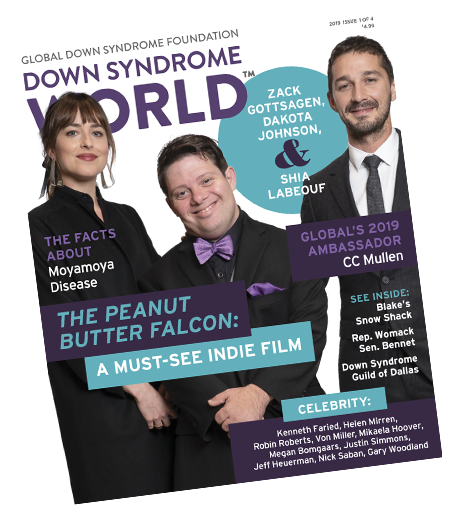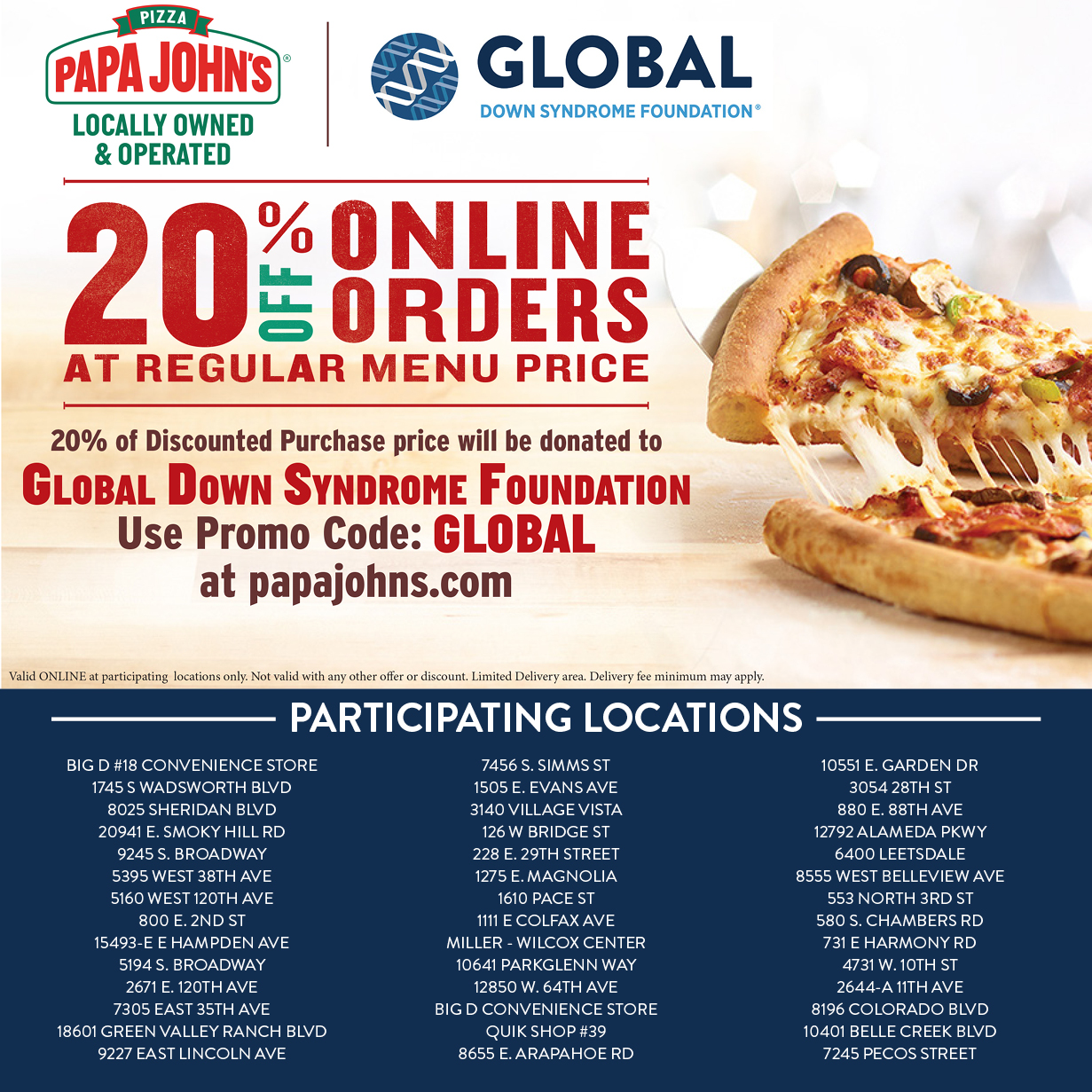The Peanut Butter Falcon: A Must-See Indie Film Starring Zack Gottsagen
May 19th, 2019 by Global Down Syndrome Foundation

Featured: Dakota Johnson, Zack Gottsagen, and his mothers, Shelley and Trish, and Shia LaBeouf at Global’s Be Beautiful Be Yourself Fashion Show. Photos: Jared Wilson
From Down Syndrome WorldTM Issue 1 2019
Film wins Audience Award at the prestigious South By Southwest (SXSW) Film Festival, and audiences fall in love with Global Down Syndrome Foundation’s Q-Award winner. The key to the movie’s success? Friendship.
ZACK GOTTSAGEN IS NO STRANGER to the spotlight — in fact, he dances right into it. Last year, Gottsagen received the Global Down Syndrome Foundation Quincy Jones Exceptional Advocacy Award. After giving a powerful acceptance speech, he literally threw off his jacket and unexpectedly danced down the runway, charming a crowd of over 1,400 guests at Global’s 10th Anniversary Be Beautiful Be Yourself Fashion Show.
The accomplished actor, who is 33 years old and happens to have Down syndrome, stars alongside Shia LaBeouf and Dakota Johnson in a new feature-length indie film called The Peanut Butter Falcon. Gottsagen’s breakout role and the film were praised by Variety magazine’s review: “… there’s something so guileless and genuine about Zak (qualities that stem directly from the actor playing him) that he manages to win over both his newfound friend and the audience in the same coup.”
The review goes on to focus on the relationship between LaBeouf’s and Gottsagen’s characters. “… Both [their acting] approaches result in a kind of spontaneous unpredictability, making the characters’ choices feel constantly surprising.” Definitely two thumbs-up!
The Peanut Butter Falcon tells the story of a young man with Down syndrome, Zak (Gottsagen), who escapes from the nursing home where he pines to follow his dream of becoming a professional wrestler. Along the way, he meets Tyler (LaBeouf), a troubled traveler with a mysterious past, and Eleanor (Johnson) who is sent from the nursing home with orders to return Zak to the facility. The film also includes award-winning actors Thomas Haden Church, who plays a retired wrestler, and Bruce Dern, Zak’s roommate who helps him escape from the nursing home.
In March, Gottsagen and LaBeouf promoted the film together at the prestigious SXSW Film Festival in Austin, Texas, where The Peanut Butter Falcon won the “Narrative Spotlight” Audience Award.
The filmmakers are hoping to land a distribution deal and release by summer of 2019.

The Peanut Butter Falcon crew at the 2019 SXSW Film Festival. Global’s Q-Award winners Colin Farrell and Zack Gottsagen strike a pose with Gottsagen’s moms, Shelley and Trish.
DESTINED TO BE AN ACTOR
Gottsagen was born with an irresistible charm and drive to change the world. Just ask his mom Shelley Gottsagen.
“Zack has this ability to connect with people from all walks of life,” she says. “He has a real compassion and love for people.”
He was also born with the rare vigor and determination necessary to succeed in the entertainment business.
“Zack tells everyone he meets about his passion for acting , which landed him a lead role in a feature film,” she adds.
“I have wanted to be an actor since I was 3 years old,” Zack says. “I want to show people that no matter who you are, if you follow your heart, you can do whatever you want with your life.”
It was this charisma and determination that led to Gottsagen being cast as one of the first actors with Down syndrome to star as the lead in a full-length feature film. Co-writers and directors, Tyler Nilson and Michael Schwartz, explained their inspiration to write The Peanut Butter Falcon.
“Zack told Michael and me that we should write a movie for him to star in,” Nilson says. “We thought it was genius!”
Nilson and Schwartz had worked with Gottsagan on other short films at Zeno Mountain Farm, a nonprofit that hosts inclusive camps in Vermont, California, and Florida for people of all abilities . They were taken not only by his acting ability but his uncanny sense of timing and skill at reading others. But how to capture that on screen?
Schwartz continues, “Being friends with Zack for many years, we tried to create the most authentic experience we could for our audience by writing a character that is really tailored to Zack and his strengths.”
Gottsagen’s character in The Peanut Butter Falcon, “Zak,” is consistent with Zack the actor in elements such as his love of wrestling and caring, determined spirit.
The result is truly a must-see movie. Variety likened it to indie great Little Miss Sunshine and blockbuster hit Forrest Gump, calling it “a feel-good niche indie with its priorities in the right place.”
GOTTSAGEN, LABEOUF, & JOHNSON ON-SCREEN CHEMISTRY
 This article was published in the award-winning Down Syndrome World™ magazine. Become a member to read all the articles and get future issues delivered to your door!
This article was published in the award-winning Down Syndrome World™ magazine. Become a member to read all the articles and get future issues delivered to your door! A huge part of any movie’s success is the on-screen chemistry of its actors. The Peanut Butter Falcon has this in spades because the actors became very close while filming. And they have remained close — supporting each other at award ceremonies and keeping in touch frequently through text messages and phone calls.
The bonding happened remarkably fast. Once Nilson and Schwartz finalized the script, the crew had only 30 days to film on the isolated beaches of Savannah, Georgia. Being together every day for a month and working through late hours of the night, the cast truly became a family. Every morning before they started shooting, Gottsagan would give the team a pep talk.
Gottsagen’s mom, Shelley, recalls, “He would call out certain members of the group and thank them for what they did that day. It really gave everyone that extra boost of confidence and created a sense of community.”
For LaBeouf and Gottsagen, their relationship began before the two ever met.
“I saw a video of Zack and thought it would be incredible to work with him. I fell in love with him before I even met him,” LaBeouf explains.
LaBeouf, Johnson, and Gottsagen would eat lunch together every day during filming. Gottsagen consistently ate only chicken. Johnson even named her rescue cat “Chicken” because she said it would make her think of Gottsagan when she was home. While LaBeouf and Gottsagen would watch wrestling together every Monday and Tuesday, Johnson would get mani/pedis with Gottsagen once a week.
“When I met Zack just before we started filming The Peanut Butter Falcon, I was totally bewildered by his purity of heart,” Johnson explains. “He is extremely intelligent, kind, charming, hilarious, and deeply empathetic. He’s the most loving and embracing person I’ve ever met in my life.”
IMPROV GOLD
It was important to the film’s stylistic integrity to keep everything as realistic as possible.
“Zack insisted that he do all of his own stunts,” Shelley recalls. “I couldn’t believe that he jumped off the wooden bridge into the water or that he grabbed a fish with his bare hand! But he wanted it to be real.” She explained how this process wouldn’t have been possible without Nilson and Schwartz’s imaginative vision.
“They allowed Zack to have creative control with his scenes, which really made a difference in bringing his character to life.”
“Often, what Zack and Shia came up with was even better than what was on the page,” Nilson says. “Some of the funniest lines and bits in the film, I have to admit, actually come from Zack’s improv!”
Schwartz adds, “With Zack and Shia, we created a space for them to actually live the scenes.”
LaBeouf confirms how special the interaction was. “When Zack and I met, we would just start riffing with each other [while filming],” he says. “Everywhere it went, we’d wind up with gold. We had really deep conversations that I could only have with Zack.”
Gottsagen agrees. “We practiced our lines, but we were able to make it real, and that’s what it’s all about.”
During red carpet interviews at SXSW, the whole cast and crew spoke to the understanding, patience, and appreciation they developed for people with Down syndrome by working with and learning from Gottsagen.
Schwartz summed it up. “There’s a magic that Zack brings to every scene. With him, he’s not just saying his lines, he’s actually feeling the moment.”
AN IMPORTANT ROLE MODEL, AN IMPORTANT FILM
Gottsagen caught Global’s attention when a Global Ambassador, Chase Turner Perry, identified a family connection to a producer of The Peanut Butter Falcon.
“We were actually a little nervous as we can’t support a film, even a great film, if the messaging is counter to our advocacy work,” says Michelle Sie Whitten, President and CEO of Global. “So we organized a screening in Denver last May, and I was blown away by how excellent the film is, how it pulls you in, and how the film makes important societal statements that the Down syndrome community would be proud of.”
After spending a good amount of time with Gottsagen, Whitten and her team made the decision to honor Gottsagen with Global’s 2018 Quincy Jones Exceptional Advocacy Award at their 10th Anniversary Be Beautiful Be Yourself Fashion Show, the largest fundraiser for people with Down syndrome in the world.
“Zack is a role model and inspiration not just for people with Down syndrome, but for all of us,” says Whitten.
To Whitten’s surprise, The Peanut Butter Falcon family immediately rallied, and LaBeouf, Johnson, Nilson, Schwartz, and other crew members descended upon Denver to support Gottsagen. LaBeouf and Johnson both introduced Gottsagen and helped bestow the Global award.
Now Global is part of the family supporting Gottsagen and traveled to Austin to cover him and The Peanut Butter Falcon at SXSW. Johnson was not able to attend but sent her best wishes to Gottsagen via text. LaBeouf and Gottsagen walked the red carpet together, laughing, joking, and posing for photos.
During the screening, the audience laughed and cried. When the credits started to roll, there was a standing ovation. At the end of the Q&A that followed, Gottsagen took the microphone.
“I make Shia’s life better every day,” he told the SXSW audience. LaBeouf laughed and nodded in agreement. The sincere and unique friendship, both on and off the screen, is undeniable.
Like this article? Join Global Down Syndrome Foundation’s Membership program today to receive 4 issues of the quarterly award-winning publication, plus access to 4 seasonal educational Webinar Series, and eligibility to apply for Global’s Employment and Educational Grants.
Register today at downsyndromeworld.org!
Support Global with Papa John’s Pizza
May 17th, 2019 by Global Down Syndrome Foundation

Order your pizza at papajohns.com from your closest participating store using promo code “GLOBAL” to get 20% off and support Global!
May 2019 Newsletter
May 17th, 2019 by Global Down Syndrome Foundation
Global’s AcceptAbility Gala is a Success!
Roadside Lands Shia LaBeouf Adventure Comedy ‘The Peanut Butter Falcon’
May 15th, 2019 by Global Down Syndrome Foundation
Scientists At The Crnic Institute Publish First Cases Of Immunotherapy For Alopecia Areata In People With Down Syndrome
May 15th, 2019 by Global Down Syndrome Foundation
A potential pathway to normalizing the larger problem of immune system dysregulation
Oliver has had alopecia areata since early childhood. (Left Photo Credit: DigPicPhoto)
Press Contacts:
Rejena Carmichael | rcarmichael@globaldownsyndrome.org | C: (240) 603-5494
Anca Call | acall@globaldownsyndrome.org | C: (720) 320-3832
May 14, Denver, CO – Researchers and doctors at the Linda Crnic Institute for Down Syndrome (Crnic Institute), the University of Colorado Department of Dermatology, and the Palo Alto Medical Foundation in California have just published the first report of safe and efficacious use of an immune modulatory strategy to treat alopecia areata in individuals with Down syndrome. The drug featured in the publication is called Xeljanz, also known as Tofacitinib, which belongs to a class of drugs known as ‘JAK inhibitors.’
The results in this publication hold promise not only for the treatment of alopecia areata but could possibly hold the key for other autoimmune disorders and ailments found in people with Down syndrome. This research builds upon the Crnic Institute’s groundbreaking discovery that people with Down syndrome have profound immune system dysregulation and autoimmunity associated with chronic activation of a branch of the immune system known as the interferon response.
Alopecia areata is an autoimmune disorder in which the immune system mistakenly attacks the hair follicles, causing hair loss. People with Down syndrome have up to a ten-fold higher risk of developing alopecia areata than the typical population, as well as increased risk of developing many other immune disorders.
The research team studied how the drug Xeljanz impacted two individuals with Down syndrome who have alopecia areata. The scientists discovered a remarkable recovery of hair growth within weeks of beginning treatment, and with no measurable side effects. The study results were published on April 5, 2019 in the Journal of the American Association of Dermatology Case Reports.
“For the past four years, we have been hypothesizing that partially inhibiting the interferon response with specific drugs would have therapeutic benefits for people with Down syndrome, and these two cases clearly support our hypothesis,” said Dr. Espinosa, Executive Director of the Crnic Institute, an affiliate of the Global Down Syndrome Foundation (Global).
Dr. Espinosa and several expert scientists at the Crnic Institute believe that Xeljanz is a drug that could have a wide range of positive effects on a variety of health issues and the overall well-being of people with Down syndrome. Xeljanz is manufactured by Pfizer, Inc. and approved in the United States for use in other immune disorders including rheumatoid arthritis, psoriatic arthritis, and ulcerative colitis. Xeljanz has not yet been approved to treat alopecia areata.
“Clearly, Global and the Crnic Institute are interested in science that will benefit people with Down syndrome today, or at least as soon as possible,” said Michelle Sie Whitten, President and CEO of the Global Down Syndrome Foundation. “The work on interferon and the potential benefit is astounding. However, there is still much research to be done before people start prescribing JAK inhibitors. We need organized clinical trials starting specifically for people with Down syndrome and now our job is to raise that initial investment of $3 million.”
Numerous JAK inhibitors are currently being tested in clinical trials for alopecia areata and other immune diseases in typical people. Despite the fact that people with Down syndrome have a
higher risk of developing alopecia areata, exclusion criteria of these clinical trials typically make
it near impossible for a person with Down syndrome to participate.
“The next step is to design and launch a proper clinical trial for JAK inhibitors specifically for people with Down syndrome. This will take a significant amount of resources and effort, as well
as strong participation from self-advocates and their families, but it is clearly the right thing to do
at this time. The fact that people with Down syndrome have been excluded from previous
clinical trials is unacceptable,” Dr. Espinosa said.
Much of the science supported by Global and the Crnic Institute focuses on why people with Down syndrome have a radically different disease spectrum and therefore are highly predisposed to diseases such as Alzheimer’s disease and autoimmune disorders but are also highly protected from diseases such as solid tumor cancers. To learn more about the discovery accelerator for this important research, visit the Crnic Institute Human Trisome Project at www.trisome.org.
About the Linda Crnic Institute for Down Syndrome
The Linda Crnic Institute for Down Syndrome is one of the only academic research centers fully devoted to improving the lives of people with Down syndrome through advanced biomedical research, spanning from basic science to translational and clinical investigations. Founded through the generous support and partnership of the Global Down Syndrome Foundation, theAnna and John J. Sie Foundation, and the University of Colorado, the Crnic Institute supports a thriving research program involving over 50 research teams across four campuses on the Colorado Front Range. To learn more, visit www.crnicinstitute.org.
About Global Down Syndrome Foundation
Established in 2009, Global Down Syndrome Foundation (Global) is a non-profit 501(c)(3) dedicated to significantly improving the lives of people with Down syndrome through research, medical care, education and advocacy. Global is part of a network of affiliates who work together to deliver on our mission, supporting hundreds of scientists and medical care professionals. Our affiliates include the Sie Center for Down Syndrome, the Crnic Institute for Down Syndrome, Rocky Mountain Alzheimer’s Disease Center and a new pilot Adult Clinic. For more information, visit globaldownsyndrome.org and follow us on social media (Facebook, Twitter @GDSFoundation, Instagram @globaldownsyndrome).
MAY 22: Multi-Platinum Artist Andy Grammer and Local Dancers with Down Syndrome Entertain at Global Down Syndrome Foundation AcceptAbility Gala
May 14th, 2019 by Global Down Syndrome Foundation
Scientists at the Crnic Institute Publish First Cases of Immunotherapy for Alopecia Areata in People With Down Syndrome
May 14th, 2019 by Global Down Syndrome Foundation
Scientists at the Crnic Institute Publish First Cases of Immunotherapy for Alopecia Areata in People with Down Syndrome
May 14th, 2019 by Global Down Syndrome Foundation

 Experience our inspirational and groundbreaking videos and photos. Our children and self-advocates are beautiful AND brilliant!
Experience our inspirational and groundbreaking videos and photos. Our children and self-advocates are beautiful AND brilliant! Make sure your local Representatives are on the Congressional Down Syndrome Task Force.
Make sure your local Representatives are on the Congressional Down Syndrome Task Force.